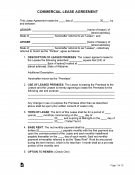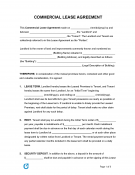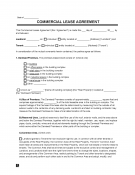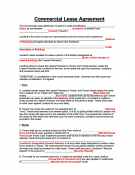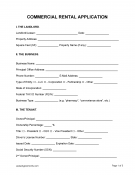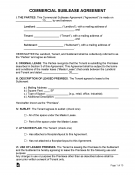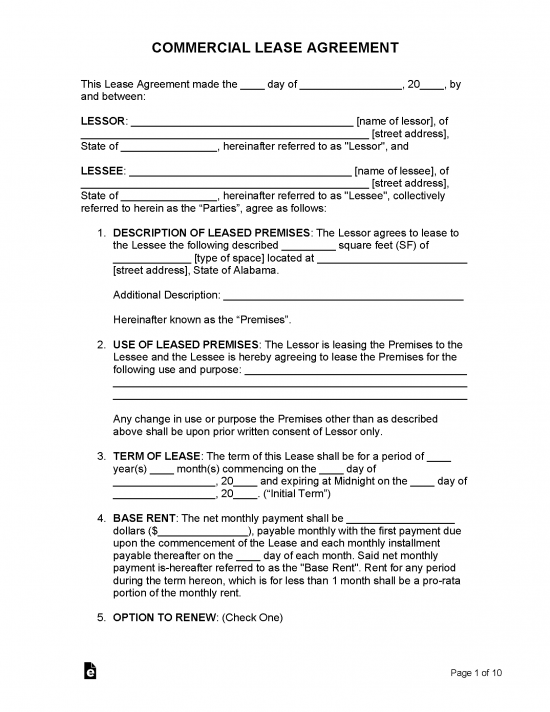A commercial lease agreement is a contract used to allow a landlord to rent property to a business-related tenant in exchange for monthly payment. The tenant will be allowed to use the property for non-residential purposes (ex. office, retail, industrial, etc.) while making monthly rent payments to the landlord typical of any lease. In a commercial lease, the tenant may be liable for real estate taxes, insurance on the property, and common area maintenance (CAM’s). It is recommended for any commercial lease to be notarized.
Table of Contents
- Commercial Lease Agreements: By State
- Commercial Lease Agreements: By Type (5)
- Frequently Asked Questions (FAQ’s)
- How to Calculate Square Feet (SF)?
- How to Calculate Price per Square Foot ($/SF)?
- What is the Average Length of a Commercial Lease?
- How to Get Out of a Commercial Lease?
- How to Personally Guarantee a Commercial Lease?
- What is a Kick-Out Clause?
- What is an Option to Renew?
- What is a Non-Compete Clause?
- What is a Right of First Refusal?
- Related Forms
By State
- Alabama
- Alaska
- Arizona
- Arkansas
- California
- Colorado
- Connecticut
- Delaware
- Florida
- Georgia
- Hawaii
- Idaho
- Illinois
- Indiana
- Iowa
- Kansas
- Kentucky
- Louisiana
- Maine
- Maryland
- Massachusetts
- Michigan
- Minnesota
- Mississippi
- Missouri
- Montana
- Nebraska
- Nevada
- New Hampshire
- New Jersey
- New Mexico
- New York
- North Carolina
- North Dakota
- Ohio
- Oklahoma
- Oregon
- Pennsylvania
- Rhode Island
- South Carolina
- South Dakota
- Tennessee
- Texas
- Utah
- Vermont
- Virginia
- Washington
- West Virginia
- Wisconsin
- Wyoming
By Type (5)
- eForms Version
- OpenDocs Version
- LegalTemplates.net Version
- TemplateLab Version
- RentalLeaseAgreements.com Version
Download: Adobe PDF, MS Word, Rich Text
Download: Adobe PDF, MS Word, Rich Text
Download: MS Word
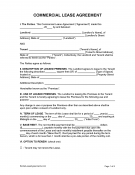 RentalLeaseAgreements.com Version
RentalLeaseAgreements.com Version
Download: Adobe PDF, MS Word, Rich Text
Frequently Asked Questions (FAQs)
- How to Calculate Square Feet (SF)?
- How to Calculate Price per Square Foot ($/SF)?
- What is the Average Length of a Commercial Lease?
- How to Get Out of a Commercial Lease?
- How to Personally Guarantee a Commercial Lease?
- What is a Kick-Out Clause?
- What is an Option to Renew?
- What is a Non-Compete Clause?
- What is a Right of First Refusal?
How to Calculate Square Feet (SF)?
Calculate square feet by measuring and multiplying the length and width of all dimensions.
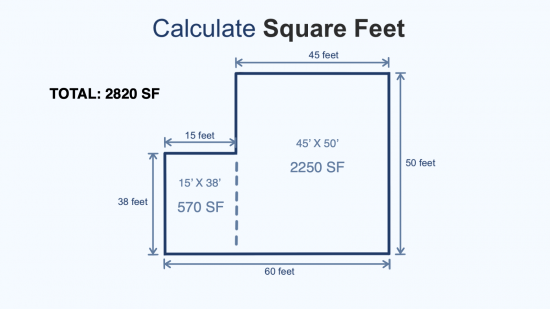
How to Calculate Price per Square Foot ($/SF)?
The price per square foot ($/SF) is calculated by the total annual rent amount divided (÷) by the total square feet (SF).
- Finding the Total Square Feet ($/SF)
Annual rent amount divided (÷) by the price per square foot ($/SF) equals the total square feet.
- Finding the Annual Rent Amount
Price per square foot ($/SF) multiplied (×) by total square feet equals the annual rent amount.
What is the Average Length of a Commercial Lease?
The average commercial lease is for a period of three (3) to five (5) years. The term may have increases in rent during preset intervals and the tenant may have the right to renew the lease at pre-determined rates.
How to Get Out of a Commercial Lease?
Getting out of a lease, without a kick-out clause, requires the consent of the landlord to be released. In a commercial lease, the landlord will usually hold the leverage and can sue the tenant for all unpaid rent for the remaining term. This is a case that is usually winnable by the landlord, so unless the tenant can come up with a solution, they will be liable for the full rent amount.
How to Personally Guarantee a Commercial Lease?
A personal guarantee is when a tenant personally co-signs an agreement so if the business cannot pay they agree to pay for any liability on a personal basis. For example, if the business cannot pay rent and defaults on the lease the tenant’s personal possessions such as vehicles, real estate, or other personal possessions are subject to be re
What is a Kick-Out Clause?
A kick-out clause allows the tenant to terminate the lease under pre-determined conditions. For example, the tenant may have a kick-out clause at the end of year 1 if they want to make sure their sales will be aligned with their projections.
If a tenant does enact a kick-out clause, they will be able to vacate the premises and terminate the lease without liability.
What is an Option to Renew?
An option to renew allows a tenant to renew the lease at their sole decision under the terms stated in the agreement. This is common for retail tenants due to a business’s success being determined by its location.
What is a Non-Compete Clause?
A non-compete clause restricts a landlord from renting to another tenant under a similar use as an existing tenant. A tenant will commonly request this if being made part of a larger retail shipping mall in order to restrict new competition from entering the location.
What is a Right of First Refusal?
A first right of refusal clause allows the tenant the right to buy the property if someone else has placed an offer. The tenant would have the first right to purchase the property under the same or similar terms to the original offeror.
Related Forms
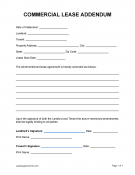 Commercial Lease Addendum – To add to a commercial lease to expand on any subject matter or amend the agreement.
Commercial Lease Addendum – To add to a commercial lease to expand on any subject matter or amend the agreement.
Download: Adobe PDF, MS Word, Rich Text Format
Download: Adobe PDF, MS Word, OpenDocument
Download: Adobe PDF, MS Word, Rich Text Format
